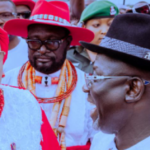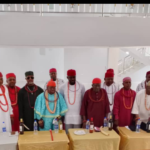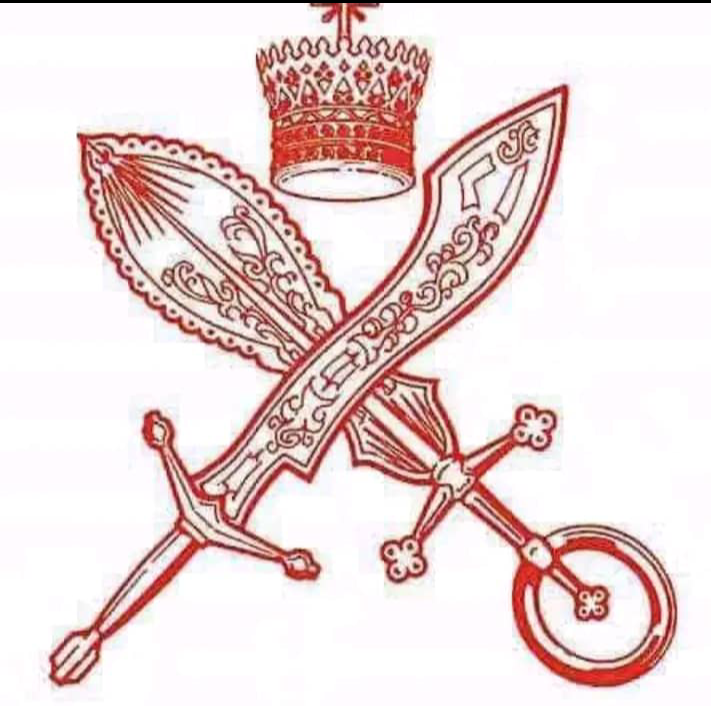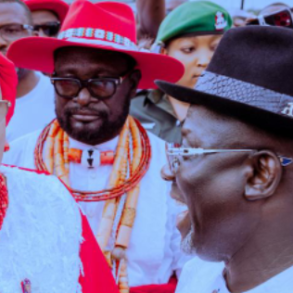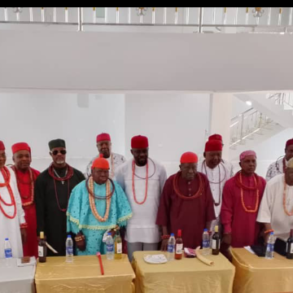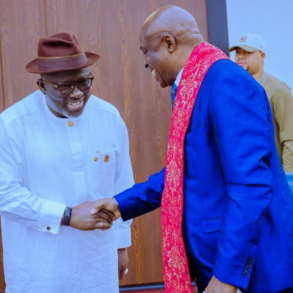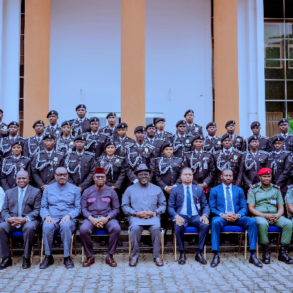By Andrew Darah –
The Urhobos are the majority ethnic group in Delta State. They occupy Delta Central exclusively part of Delta South. The region has nine local government areas out of the 25 local governments in the State.
The neighbouring tribes are the Isokos at the South East, the Itsekiris at the West; Ijaws at the South and Ukwuani nation at the North East.
Oral tradition proves that the history of the Urhobos is traced to Edo territory. They migrated to various locations including their present settlement at the end of the Ogiso dynasty.
Urhobos’ exodus was not like that of the Israelites where the movement was once and for all. In the case of the Urhobo people, it was various groups; each moving at its pace, seeking homely territories, thus, twenty-four sub-groups that make up the Urhobo nation, including Okpe – the largest.
Urhobo people share a common ancestry with the Edos. It was said that the Urhobos migrated from Edo. They share similarities in language and culture e.g ‘Efe’.
Urhobo people also share similar traits with the Isokos of Delta State. At a point, colonial masters referred Isoko and Urhobo as the “Sobo” people. However, this was fought against by both tribes. Currently, the Isokos and Urhobos understand one another slightly with regards to language.
The Urhobo nation is of sub-cultural units, not a geographical unit. What binds the various sub-cultural units together is the Urhobo culture and tradition.
Linguistically, there are differences. Some of these sub-groups include the indigenous people of Okpe that reside in Orerokpe, Sapele, Amukpe, Aghalokpe, etc. The Uvwie people of Effurun and it’s environ, the Agbons of Okpara, Kokori, Eku, Ovu-Oviore, etc. The Abraka’s, the people of Ughelli, the Agbassa people, etc.
Culture:
Owing to the nature of the environment occupied by the people that is close to the River Niger, their histories, mythologies, and beliefs are water-related.
Thus, the two-day annual Ohworu festival in Evwreni, the southern part of the Urhobo area where the Ohworhu water spirit and the Eravwe Oganga are displayed.
Also included in the heritage of the Urhobo people is the annual fishing festival that involves masquerades, fishing, swimming and dancing contests.
The king in Urhobo kingdom is called ‘Ovie’. His wife, the queen is called ‘Ovieya’ while his children (prince and princess) are called ‘Ọmọ Ovie’.
There are a few exceptions. For instance, in Okpe, the traditional ruler is known as “Orodje”. Okere-Urhobo calls their king, “Orosuen”. Ughievwe addresses their king as, ‘Okobaro’, while that of Agbarho is “Osuivie” and a king in Orogun is called “Okpara – Uku”.
However, with the same ancestral background, most of their customs and traditions are similar in certain areas such as the breaking and wedging of kola-nut presented to a visitor or in an occasion. Prayers are said before the sharing of the kola nuts and drinks, payment of bride prize, burial rite e.t.c.
Marriage:
The marriage rite of the Urhobo people is unique in nature.
Traditionally, when a suitor is interested in an Urhobo maiden, he courts her. Once she agrees to marry him, the marriage begins.
Different from other ethnic traditions where the bride would first inform the father of the intentions of the groom. In Urhobo culture, the opposite is the case.
She would first inform her mother who is her primary guardian. The mother, after getting the necessary information, informs the father.
The father, in turn, invites the young man. On the first visit of the groom-to-be, tradition demands that he comes alone with a bottle of gin to introduce himself formally.
Later, as agreed by the father, the groom would come again; this time, with his parents and relatives to speak on his behalf.
Formal approval for marriage is given by the bride’s parents or the representatives. Traditional rites of pouring the gin brought by the groom as a libation to the father’s ancestors to bless them with good health, children, and wealth.
Belief:
“Ọghẹnẹ” (Almighty God) is the main focus of the Urhobo traditional religion. He is recognized as the Supreme One’. Edjo and Erhan (divinities) are recognized as well. To them, these two deities are regarded as personified attributes of “Ọghẹnẹ”.
The Urhobos also worship God (with white chalk). If an Urhobo feels oppressed by someone, he appeals to Ọghẹnẹ. He believes to be an impartial judge to adjudicate between him and his oppressor.
Classified into four main categories, Urhobo divinities, probably coincide with the historical development of the people are guardian deities, war deities, prosperity deities and fertility and ethical deities.
However, it is important to note that the fundamental factor and manifestation of all deities in the belief system of Urhobo is “Ọghẹnẹ” (Almighty God).
Kingdoms of Urhobo nation:
There are 24 kingdoms in Urhobo nation, namely; Olomu kingdom, Agbarho kingdom, Ogor kingdom, Idjerhe(Jesse) kingdom, Okpe kingdom, Agbarha-Otor kingdom, Okparabe kingdom, Okere-Urhobo kingdom, Uvwie kingdom, Effurun-Otor kingdom, Arhavwarien kingdom, Udu kingdom, Orogun kingdom, Umiaghwa-Abraka kingdom, Orhuarivie-Abraka kingdom, Eghwu(Ewu) kingdom, Ughelli kingdom, Evwreni kingdom, Agbarha-Ame kingdom, Ughievwen kingdom, Uwheru kingdom, Agbon kingdom, Oghara kingdom and Mosogar kingdom.
Values of Urhobo:
Urhobo tradition or culture has its own authentic institutions and patterns of behaviour and values. It is a tradition or culture that values highly the ideals of truth, liberty, social justice, and achievement.
Greetings:
The Urhobo people usually greet by saying Migwo /mi:gwɔ:/ which means “I am kneeling o” and the response is Vrendo /vrɜ:dÖ/ which means “Stand up. Thank you.” Whereas Mavor? /ma:vɔ:/ means “How are you?”.
Main occupation of the Urhobo people:
The natural terrain of wetland and dry land afforded the Urhobo people their traditional occupations of fishing, hunting, farming, palm oil production, etc. Darah (2010) describes the Urhobo palm nut collectors as astronauts and the best in oil palm producers in the world.
Taboos in Urhobo:
A married woman from Urhobo extraction neither allow another man other than the husband to lap her nor laps another man. She does not board bike with another man sitting in front or behind another man. The married Urhobo woman does not eat in the same plate with other man.

